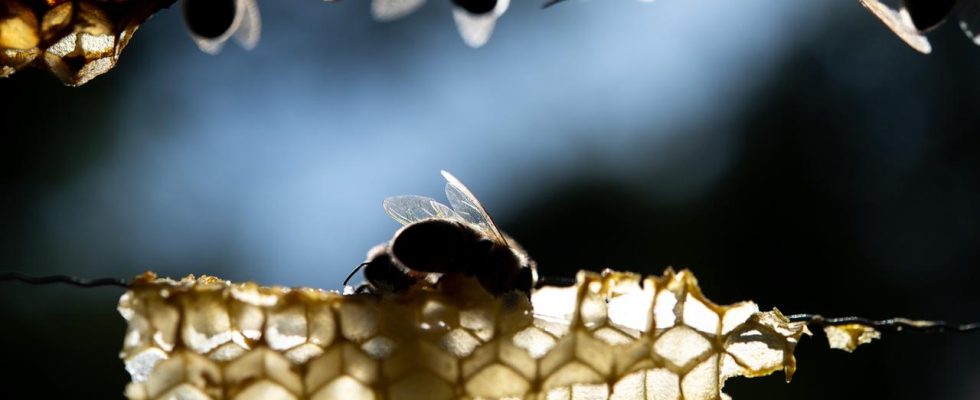Among other things, bees are threatened by diseases such as American foulbrood. At the beginning of the year, a vaccine was approved in the USA for the first time – and so far everything is going according to plan.
Surrounded by the mountains of North Dakota, Chris Hiatt stands in his beekeeping suit and looks after his hives. He is responsible for a total of around 19,000 beehives. Some of the animals have now been vaccinated against American foulbrood: “We didn’t notice any difference in the behavior of the vaccinated and unvaccinated bees,” he reports. “But the vaccinated ones didn’t get foulbrood, so it seems to be working. It’s looking promising at the moment.”
Hiatt is not only a passionate beekeeper, but also President of the American Honey Producers Association. His association is extremely concerned because there is an increasing number of bee deaths. According to a survey of beekeepers, almost half of all colonies in the USA did not survive last winter. One of the reasons for this: Diseases like American foulbrood.
Via the queen to the larvae
The first vaccine against it has been available in the USA since January. It is manufactured by Dalan Animal Health. “We take the pathogens and kill them, like with a very traditional vaccine,” explains boss Annette Kleiser. The vaccine is fed specifically to the queen so that immunity is built up in her and parts of the vaccine are passed on to the ovaries.
In the end, the queen’s larvae should be immune to the disease. Beekeeper Marcus Pollard considers this principle to be future-oriented: “The vaccination is successful and will change everything for beekeepers,” he believes. “It will probably become one of the standard vaccinations for the big beekeepers.”
But first comes the big test in the next few months, says Kleiser: “A very big problem is hibernation, so that no diseases over winter or autumn weaken the trunk so much that it doesn’t make it through the winter.”
How does the immune system of bees work?
We share the innate immune system with insects; but the insects lack the adaptive immune system that we humans also have and that is the basis of vaccinations. “I would therefore not speak of a vaccination,” says Elke Genersch from the State Institute for Apiculture in Hohen Neuendorf. “Because invertebrates don’t have an immune system with a memory function like we do. I would therefore speak of ‘transgenerational immune priming’ or cross-generational immune preparation.” A special feature is that the bacterium only becomes dangerous to larvae – adult bees do not become ill.
The queen receives the preparation and then passes it on to the larvae.
Final certainty only in a few years
So far, everything is going according to plan with the vaccine. A first study from last year shows that the principle of immunity really works in some larvae. However: “Currently, one case of American foulbrood is enough and the entire colony is closed, the beehive is burned because the disease is highly contagious,” beekeeper Pollard points out. “It doesn’t take much for the bacteria to spread from one hive to another.”
Beekeeper Hiatt from North Dakota believes that it will probably only be a few years before we can be sure whether vaccination can be used to get American foulbrood under control in the long term. “It still needs a lot of research and long-term observation of bee colonies over several years to determine the efficiency. Also to test alternatives such as medicines. So it will take some time.”

